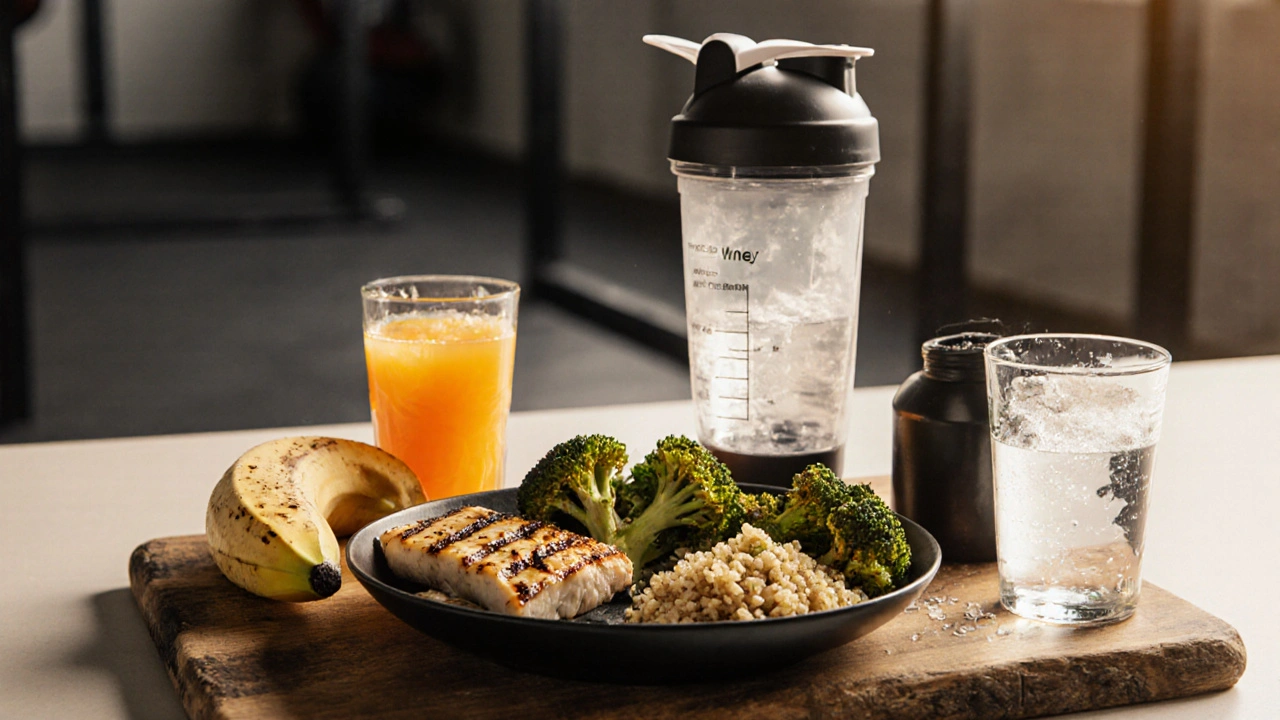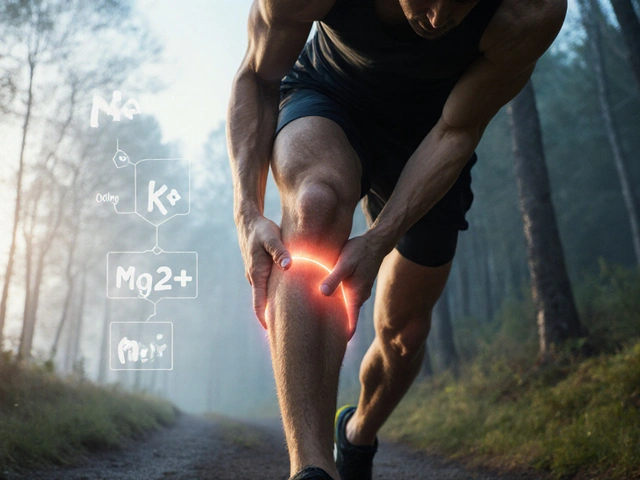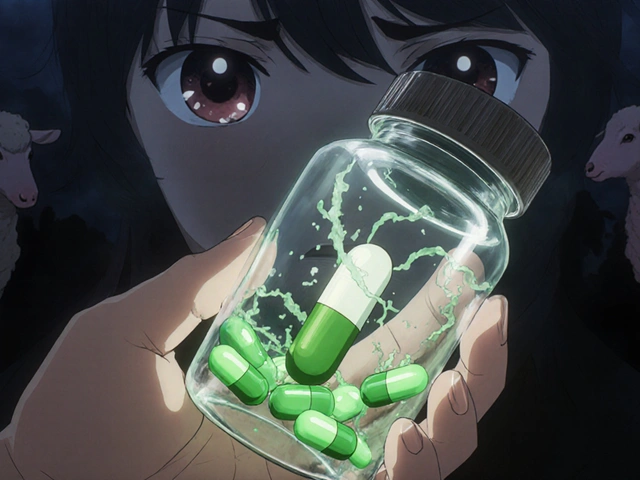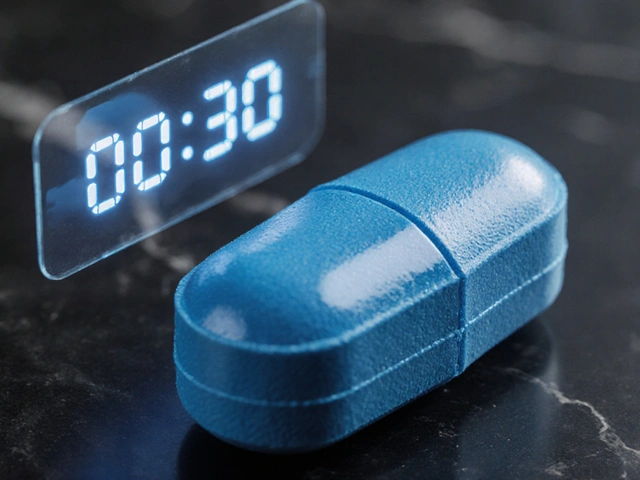Muscle Protection Nutrient Calculator
Your Muscle Protection Plan
Why This Matters
Your muscle needs change based on activity level and body size. Proper nutrients prevent cramps, strains, and rhabdomyolysis by:
- Protein rebuilds damaged fibers
- Electrolytes prevent cramps
- Carbs maintain energy
- Hydration supports muscle function
Your Nutrient Targets
Enter your details above to see personalized targets
Acute Skeletal Muscle Conditions are rapid‑onset muscle problems such as cramps, strains, and rhabdomyolysis that can sideline anyone from weekend walkers to elite athletes. They happen when muscle fibers are stressed beyond what the body can sustain, often because the tissue lacks the fuel and repair tools it needs. The good news? What you put on your plate can make a huge difference. By matching the right nutrients to the muscle’s demands, you lower the odds of a sudden flare‑up and keep your body moving.
Key Takeaways
- Protein supplies the building blocks for muscle repair and helps blunt inflammation.
- Electrolytes (sodium, potassium, magnesium, calcium) keep nerves firing correctly and prevent cramps.
- Vitamin D and omega‑3 fatty acids support muscle strength and reduce oxidative stress.
- Consistent hydration is as vital as food; even mild dehydration can trigger muscle fatigue.
- Meal timing - a blend of carbs and protein before and after activity - optimises recovery and cuts injury risk.
What Counts as an Acute Skeletal Muscle Condition?
These conditions are characterised by a sudden onset, often within minutes to a few hours of exertion. Common examples include:
- Muscle cramps: involuntary, painful contractions that can halt a workout.
- Strains and pulls: tears in muscle fibres caused by overload.
- Exertional rhabdomyolysis: a severe breakdown of muscle tissue that releases toxins into the bloodstream.
While genetics and training errors play a role, nutrition underpins the body’s ability to cope with stress. Without adequate fuel, the muscle’s repair mechanisms lag behind, making it more vulnerable.
Why Proper Nutrition Matters
Think of muscle as a construction crew. Protein supplies the bricks (amino acids) needed to rebuild damaged fibres. Carbohydrates act as the crew’s energy trucks, while fats, especially omega‑3s, keep the site’s machinery greased and protect against rust (oxidative damage). Electrolytes are the foremen that coordinate signal traffic; when they’re out of balance, the crew misfires, leading to cramps.
When you consistently deliver the right mix, the muscle can repair faster, stay stronger, and resist the cascade that leads to an acute episode.

Essential Nutrients for Muscle Protection
Below is a quick reference of the nutrients most tied to muscle stability, the amount recommended for active adults, and the foods that deliver them efficiently.
| nutrient | daily target* | best food sources |
|---|---|---|
| Protein | 1.6-2.2 g/kg body weight | lean meat, fish, eggs, Greek yogurt, lentils |
| Electrolytes (Na⁺, K⁺, Mg²⁺, Ca²⁺) | Sodium 1,500-2,300mg, Potassium 3,500mg, Magnesium 310-420mg, Calcium 1,000mg | bananas, leafy greens, nuts, dairy, salted crackers |
| Vitamin D | 600-800IU (15-20µg) | fortified milk, fatty fish, sunlight exposure |
| Omega‑3Fatty Acids (EPA/DHA) | 250-500mg combined | salmon, mackerel, chia seeds, walnuts |
| Carbohydrates | 3-7g/kg body weight (higher for intense training) | whole grains, fruit, potatoes, oats |
| Hydration | 2.5-3.7L per day (more in heat) | water, electrolyte drinks, herbal teas |
* Targets are for healthy adults engaged in regular moderate‑to‑high activity. Adjust up if you train intensively or live in a hot climate.
Practical Meal Strategies
Putting the science into a daily plan doesn’t have to be complicated. Here are three simple templates you can rotate.
- Pre‑workout fuel (30‑60min before activity): a mix of 20‑30g fast‑digesting protein and 30‑40g carbs. Example - a banana with a scoop of whey powder blended in water.
- During‑exercise electrolyte boost (if session >60min): sip a low‑sugar sports drink that supplies 200‑300mg sodium and 100‑150mg potassium per litre.
- Post‑workout recovery (within 2hours): aim for a 3:1 carb‑to‑protein ratio and include a vitamin D source if possible. Example - grilled chicken, quinoa, roasted broccoli, and a side of fortified orange juice.
These combos keep glycogen topped up, deliver the amino acids needed for repair, and replenish the salts lost in sweat.
Common Nutrition Mistakes That Trigger Muscle Problems
- Skipping protein after hard sessions: muscle fibres stay in a breakdown state, increasing soreness and injury risk.
- Over‑relying on low‑salt diets during training: insufficient sodium can cause cramping and reduced nerve transmission.
- Neglecting healthy fats: omega‑3 deficiency raises inflammation, which undermines recovery.
- Inadequate fluid intake: even a 2% loss in body water impairs muscle contractility.
Spotting these patterns early lets you tweak your intake before a minor issue blows up into an acute condition.

Monitoring and Adjusting Your Nutrition
Use a simple checklist after each workout:
- Did I hit my protein goal? (Yes/No)
- Did I drink enough water? (Aim for½L per hour of activity)
- Did I feel any tingling or cramping? (If yes, add more electrolytes next time)
- Did I get a serving of vitamin D or omega‑3? (If not, plan a source for tomorrow)
Over a week, trends will emerge. If you repeatedly notice cramps, increase potassium‑rich foods like sweet potatoes or add a pinch of sea salt to post‑workout smoothies.
Putting It All Together
At the end of the day, preventing acute muscle setbacks is about consistency, not miracle meals. By treating your diet as a toolbox - protein for rebuilding, carbs for energy, electrolytes for signal flow, fats for protection, and water for lubrication - you give your muscles the best chance to stay strong and responsive.
Remember, even elite athletes rely on the same basics. The difference is they track intake meticulously and adjust based on performance data. You can borrow that habit without needing a lab; a simple food journal or a nutrition app does the trick.
Frequently Asked Questions
Can I prevent muscle cramps just by drinking more water?
Hydration is essential, but cramps often stem from electrolyte imbalances. Adding sodium, potassium, or magnesium through foods or sports drinks usually does the trick, especially if you sweat heavily.
How much protein do I really need if I workout three times a week?
For moderate training, aim for 1.6g per kilogram of body weight per day. A 70kg person would target about 112g of protein, which can be split across meals and a post‑exercise shake.
Is vitamin D really that important for muscle health?
Yes. Vitamin D receptors are present in muscle tissue, and sufficient levels improve strength and reduce injury rates. If you get limited sun, aim for 600-800IU daily through fortified foods or a supplement.
Should I take omega‑3 supplements if I already eat fish?
If you consume fatty fish 2‑3 times a week, you likely meet the 250‑500mg EPA/DHA recommendation. Supplements become useful for vegans or those with low fish intake.
What’s the best way to time carbs around a workout?
Consume 30‑40g of fast carbs (like a banana or a slice of toast with honey) 30‑60minutes before exercise. Follow up with a similar carb portion combined with protein within two hours after finishing.








Comments
💥 This is the ultimate muscle‑saving secret, folks! 💥
If you’re proud to be American and hit the gym, your diet should match that vigor. Protein isn’t just a buzzword; it’s the steel that rebuilds ripped fibers after a hard session. Carbs give you the quick‑fire fuel you need to crush those reps and keep your glycogen tanks full. Don’t forget electrolytes – sodium and potassium are the unsung heroes that stop cramps from stealing your spotlight. Hydration is the glue that keeps everything moving smoothly, so chug that water like a true patriot.
Proper nutrition, when delineated with precision, serves as a prophylactic against acute muscular disturbances. Evidently, the synergistic intake of high‑quality protein, complex carbohydrates, and essential electrolytes augments muscular resilience. Moreover, meticulous hydration fortifies intracellular environments, thereby mitigating the risk of rhabdomyolysis. It is advisable to distribute protein consumption evenly across meals to optimise protein synthesis. Finally, a modest supplementation of vitamin D and omega‑3 fatty acids can further enhance muscular function.
From a physiologic standpoint, macronutrient timing is paramount for optimizing anabolic signalling pathways. Ingesting a 3:1 carbohydrate‑to‑protein ratio post‑exercise stimulates mTOR activation, thereby expediting sarcoplasmic repair. Electrolyte repletion, specifically sodium‑potassium balance, restores membrane potential and averts neuromuscular hyperexcitability. Hydration status directly influences blood viscosity, which impacts nutrient delivery to myofibers. Additionally, micronutrients such as magnesium function as co‑factors in ATP regeneration, essential for repeated contraction cycles. Neglecting these variables can precipitate sub‑clinical myopathy that escalates under progressive load.
Hey everyone, just wanted to add a quick reminder that consistency beats perfection every time. Aim for at least 1.6 g of protein per kilogram of body weight each day – spread it out over three to four meals. Keep a water bottle handy during workouts; losing just 2 % of body water can impair muscle contraction. If you notice lingering cramp‑like sensations, reach for a banana or a handful of nuts for potassium. Small, sustainable habits add up to big gains, so stay motivated and keep tracking your intake.
While the article provides a decent overview, it glosses over the nuance of individual variability in nutrient absorption. The recommendation of 1.6 g/kg of protein, though broadly accepted, fails to account for differing metabolic rates and genetic factors. Moreover, the advice to "drink enough water" is woefully vague; a precise quantification would be far more instructive. The language oscillates between colloquial and overly formal, betraying a lack of editorial consistency. In sum, the piece is serviceable but would benefit from a deeper, evidence‑based exploration.
The nutritional framework presented is conceptually sound, yet the execution suffers from over‑generalization. It neglects the role of periodization in dietary planning, an oversight that could misguide seasoned athletes. The emphasis on electrolytes is appropriate, though the suggested sodium dosage lacks context regarding individual sweat rates. Additionally, the article could integrate more peer‑reviewed citations to bolster credibility. Overall, the content is adequate for novices but falls short for advanced practitioners.
Good points, Nora. I’d add that tracking sweat loss with a simple weigh‑in pre‑ and post‑workout can personalize electrolyte needs. For most folks, a pinch of sea salt in a post‑run smoothie does the trick.
When one reflects upon the intricate interplay between dietary intake and musculoskeletal health, it becomes evident that a multifaceted approach is indispensable; indeed, the mere consumption of macronutrients, devoid of strategic timing and contextual relevance, is insufficient for the prevention of acute muscle pathologies. The caloric substrate-particularly carbohydrates-must be judiciously administered in proximity to exercise bouts; a pre‑exercise carbohydrate load of approximately 30–40 grams, ideally sourced from low‑glycemic options, ensures glycogen stores are primed for rapid mobilization, thereby averting the energetic deficit that precipitates premature fatigue. Post‑exercise, the anabolic window, often cited as extending up to two hours, represents a critical juncture during which the synergistic ingestion of a 3:1 carbohydrate‑to‑protein ratio facilitates the activation of the mechanistic target of rapamycin (mTOR) pathway, propelling muscle protein synthesis and expediting reparative processes. Equally paramount is the meticulous repletion of electrolytes; sodium, potassium, and magnesium function as essential co‑factors in neuromuscular excitability, and their dysregulation manifests clinically as cramping, tetany, or, in severe instances, rhabdomyolysis. A pragmatic strategy entails the consumption of a beverage containing 200–300 mg of sodium and 50–100 mg of potassium per liter of fluid lost, a guideline that can be tailored through sweat testing. Hydration, while often reduced to the simplistic admonition of "drink water," warrants a nuanced discourse; a loss of merely 2 % body mass in water can impair contractile function, reduce stroke volume, and elevate perceived exertion, thereby compromising performance and increasing injury risk. The integration of vitamin D-owing to its role in calcium homeostasis and muscular strength-and omega‑3 fatty acids-renowned for their anti‑inflammatory properties-further bolsters the musculoskeletal milieu, attenuating delayed‑onset muscle soreness and fostering recovery. It is also advisable to incorporate micronutrients such as zinc and iron, which are integral to enzymatic reactions within the oxidative phosphorylation cascade. Over time, systematic monitoring, perhaps via a concise post‑workout checklist that evaluates protein adequacy, fluid intake, electrolyte status, and micronutrient coverage, can illuminate patterns and inform iterative dietary adjustments. Ultimately, the confluence of precise macronutrient timing, electrolyte balance, adequate hydration, and targeted micronutrient supplementation constructs a robust defensive architecture against acute skeletal muscle conditions, transforming dietary habits from passive consumption to an active, evidence‑based performance enhancer.
Great breakdown, Eve! I've been doing the same and feel the difference.